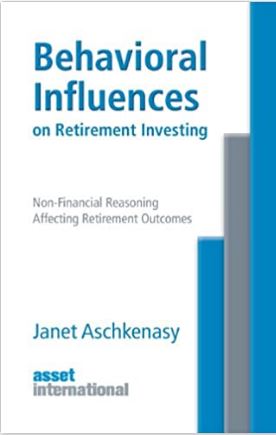Behavioral Influences on Retirement Planning: Non-Financial Reasoning Affecting Retirement Outcomes
By Janet Aschkenasy
The supposed rational logic of the market is no longer understood to exclusively motivate economic decision making.
Behavioral economics is now a vital part of university curriculums.
Both lay persons and professional retirement investors at times manage money on irrational behavioral factors.
Janet Aschkenasy, a veteran business writer, discusses the insights of leading behavioral economics scholars and draws upon current research to describe “decision making” practices among individuals and retirement managers. Often higher investment returns are forfeited to a behavioral reflex.
This book explores common behavioral factors and how retirement plans have attempted to minimize non-rational behavioral retirement investment.
Source @Amazon
500 views










